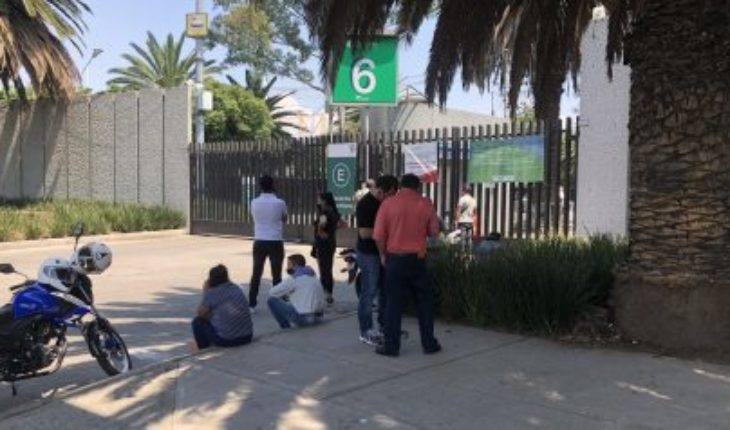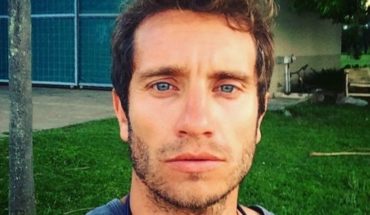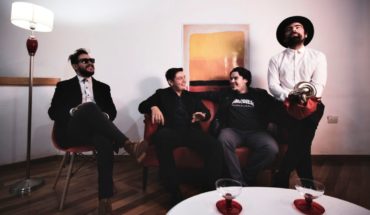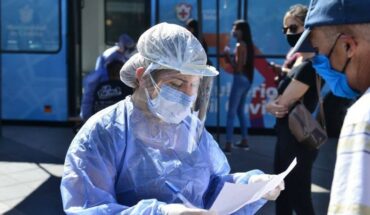Marisela’s husband had such a low blood oxygenation that he arrived almost purple at the expansion hospital enabled at the Hermanos Rodríguez Autodromo and administered by IMSS. He had previously gone to three other hospitals where he wasn’t received.
Al Autodromo arrived this Monday, May 18, at around 7 p.m. He had less than 70 oxygen in his blood, when it normally doesn’t drop below 95. He was admitted. But Marisela hasn’t heard from him again.
At Gate 6 of the Autodrome, a place formerly dedicated to entertainment and now converted into a temporary hospital in front of the Covid-19 pandemic, about 20 people are waiting for reports of their relatives.
Although a few days ago images appeared on social media showing a row of ambulances entering the facility, with messages alerting the overflow of the epidemic in the country and the collapse of hospital services, today, May 19, through the door dedicated to the entry of those emergency vehicles, the 7th, none enters.
Read: CoVID-19 patients not severe but with risk factors will be hospitalized at the Autodrome
Marisela says patients have arrived, but through gate 6. About eight, between 11 a.m. and 3 a.m. All have arrived on their own in private vehicles or taxis. All have been received and entered.
“If they take care of them, but they don’t tell us anything, no doctor, no nurse. Only the guard is passed reports and he’s calling some of the relatives. We don’t get any news. They just tell us that of those who entered yesterday there is still no report and that if they do not call us it is because they are stable.”
This expansion hospital – enabled along with others to try to take pressure off the saturated hospitals of the Valley of Mexico – is equipped with 218 beds, all with oxygen disposition; of these, 26 will go to critical respiratory care and the remaining ones are divided into eight modules with 24 beds each.
At its maximum capacity, this expansion hospital is expected to treat 550 patients, according to information disseminated by IMSS when the unit started operating.
Marisela does not stray from the café bars of Gate 6 of the Autodrome. She’s all dressed in black, and wears a sketch cover of the same color. The hair picked up in a tail, very black too. His olive green eyes are sad.
Like the rest of the relatives, they’ve asked him to go home. “But there I despair more. I left in the early morning and came back at 11 a.m. I brought some personal hygiene stuff they asked for for my husband. I already delivered them. But they don’t tell me anything and it’s distressing. I’m very worried because my husband is very anxious and didn’t want to come.”
Late arrival
Like many other patients, Marisela’s husband, a 44-year-old man, who is 20 kilos overweight and a businessman, delayed admission to the hospital. The lady says he had been having trouble breathing for more than six days.
“At first he didn’t tell me anything. I just saw it weird. I even told one of my daughters (aged 12 and 18) that I did not notice her dad strangely. He didn’t laugh or talk anymore. It was until last Wednesday that he told me he was having trouble breathing.”
Read: IMSS admits “relevant problems” at Iztacalco Hospital where COVID suspects waited in tents
Marisela took her husband to a similar pharmacy. The doctor over there reassured them. He told them it wasn’t Covid. He assured that the patient’s bronchi were closing but that everything would be fixed with injections and pills. They sold them right there.
But the patient didn’t get any better. They decided to call an acquaintance who’s a doctor. He advised them to go to a private lab and request a chest x-ray.
“They told us that his lungs were very swollen. My husband’s doctor friend told us to take him to a hospital where he used to work, I don’t know what institution he was from. He gave us the address and we went. They didn’t get it. They said they didn’t have the equipment to take care of him. But they gave us a sheet to put it in another,” Marisela says.
Of that other it does remember the name, the General Hospital Chimalhuacán 90 Camas. Only they didn’t put him in there either. “We were told there was no room and they could not receive it. We went to a private clinic and they didn’t want to take care of him, which there were no patients like my husband with shortness of breath.”
It was Marisela’s nephews who suggested they go to the Autodromo Hermanos Rodríguez. They had seen on TELEVISION that they were getting patients there. They lined up over there. At 7 o’clock at night Marisela’s husband finally got hospital care, with the countenance already almost purple, she says.
Now Marisela expects her husband to recover. “It’she’s very worried. We have debts. He’s a merchant, he sells plastic dolls. I hadn’t been selling for more than 20 days. We don’t know how he got if he has that disease, but I doubt it’s that. They don’t have it next to Covid’s in there, do they?” he asks.
How do we leave if they don’t give us news
A few yards from her is another lady, whom we’ll call “Sara.” Your husband also arrived at the Autodrome last night. They channeled it here from the General Hospital of Mexico, where they did not have beds to hospitalize it.
Sara says her husband, 53, without risk factors, has had no fever, no cough, but since Saturday she had difficulty breathing. “We went to a private doctor and he told us he lacked oxygen, but he didn’t want to hospitalize. He said if he was going to be intubated, he’d better die at home. Only their daughters, I’m the second wife, clung to take him yesterday (Monday) to the General.”
Read: Enable Autodrome as ‘expansion hospital’ to deal with COVID-19 cases
By the time she got there, the woman narrates, her husband no longer had the strength to stand. They put oxygen in him, stabilized him. They took an X-ray and channeled him to the Autodrome. The family had to take him on their own, in a taxi.
“They did receive it, and even that fast, but now they don’t tell us anything. I was told to leave and come back at 6pm, see if there are any reports. I can’t come and go. I can’t be spending on tickets. I live to Iztapalapa. My husband’s a carpenter. Two months ago he didn’t have a job because of the disease this, because of where do I take?”
Across from the café grille at Gate 6 of the Autodrome is another woman. She’s also expecting news from her husband. Here outside this expansion hospital, statistics appear to confirm that the greatest risk of complications by Covid is the male gender: of those who have died from this disease, 68% are men and 32% women.
The lady’s name is Teresa and her eyes are watery. She arrived with her husband at the racetrack this Monday afternoon. He’s also a referral from the General Hospital. They told him the same thing: they didn’t have beds anymore.
“It distresses me that they don’t tell me anything. My husband didn’t want to go to a hospital. He had been coughing and fever for about seven days now, and on Saturday he started with trouble breathing. Yesterday (Monday) we were already very bad. He tried to pull and pull air and said he felt like he was drowning. We went to the General.”
But like Sara’s husband, Teresa’s husband was also stabilized and sent to the Autodrome. “I’m a little calm because he’s already in, but they should inform us. We’re all out here with our souls in a thread. If they want us to leave, then let them tell us how they are.”
What we do in Animal Político requires professional journalists, teamwork, dialogue with readers and something very important: independence. You can help us keep going. Be part of the team.
Subscribe to Animal Político, receive benefits and support free journalism #YoSoyAnimal.
translated from Spanish: Patients arrive at the Autodrome when they find no care in hospitals
May 20, 2020 |





